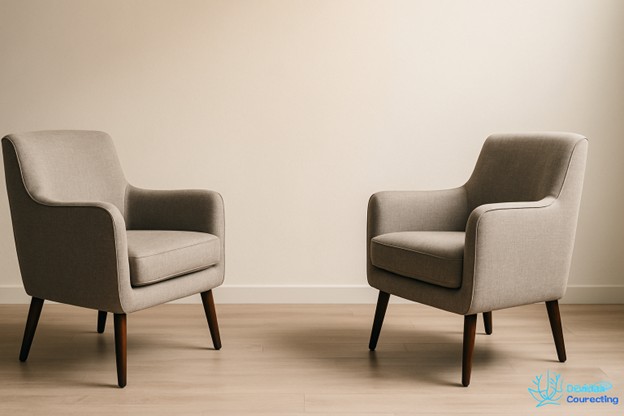The Dos and Don’ts of Couples Therapy: How to Get the Most Out of Your Sessions
Therapy Isn’t a Last Resort—It’s a Thoughtful Step Toward Growth
If you’ve ever searched “couples therapy Vancouver” or “marriage counselling near me,” you’re not alone. Many couples begin considering therapy during a time of stress—when communication breaks down, connection feels distant, or recurring conflicts leave both people emotionally drained.
But here’s something important to understand: couples therapy isn’t just for relationships in crisis. In fact, it’s most effective when both partners are still invested and open to learning. You don’t have to wait for a major breaking point to benefit from outside support.
According to the American Association for Marriage and Family Therapy, 70–75% of couples who undergo Emotionally Focused Therapy (EFT) move from distress to recovery. Meanwhile, data on Integrative Behavioral Couples Therapy (IBCT) shows about a 71% improvement rate among participating couples—evidence that effective therapy does more than solve immediate problems. It strengthens the emotional foundation of a partnership.
The truth is, no relationship is perfect. Every couple develops unspoken patterns, communication habits, and emotional triggers. Sometimes these patterns help you stay close. Other times, they quietly drive you apart. Therapy offers a space to step back, reflect, and rebuild. Not by assigning blame, but by increasing understanding.
That’s where this post comes in.
In the sections ahead, we’ll walk through:
- The dos—behaviours and mindsets that make therapy work
- The don’ts—common pitfalls that often slow progress
- How to set realistic expectations as you begin
- And why showing up with intention matters more than having all the answers
Whether you’re in the early stages of conflict or just want to reconnect with your partner more deeply, this guide is here to help you prepare for success.
At the end, we’ll also share a bit about how therapy is approached at Sigpark Counselling in Vancouver, including what to expect from your first session and how to find the right fit for you as a couple.
Let’s begin.
Why Couples Therapy Works (When You’re Both Engaged)
It’s easy to assume that the success of therapy depends on the therapist. And while a skilled therapist absolutely plays a key role, the biggest predictor of success isn’t the techniques used—it’s how both partners show up.
Couples therapy is not a magic fix. It’s a structured space for two people to better understand each other, repair damaged trust, and develop new patterns of communication. But for it to work, both partners need to participate with honesty, curiosity, and openness.
Let’s break that down.
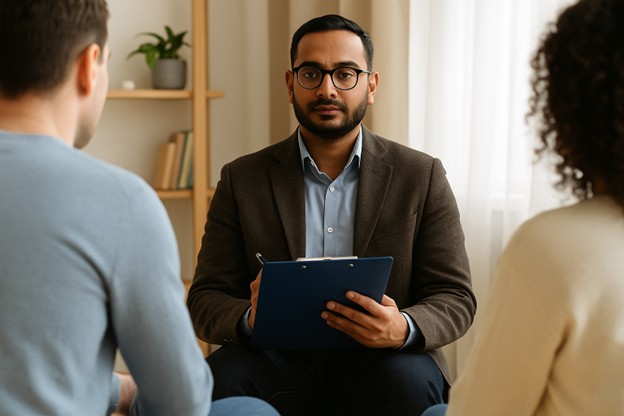
Therapy Is a Mirror, Not a Lecture
One of the first things couples learn is that therapy won’t just tell you what to do. It holds up a mirror to the relationship—reflecting back your communication habits, emotional dynamics, and coping strategies. Sometimes that mirror is uncomfortable. But discomfort is often where change begins.
The Relationship Is the Client
In individual therapy, the therapist focuses on one person’s healing. In couples therapy, the relationship becomes the “client.” This means that even if one partner feels more at fault, both have a role to play. Both voices matter. Both experiences shape the process.
In fact, research from the Gottman Institute—a leading authority on relationship health—shows that mutual engagement is one of the most powerful predictors of long-term relationship success. Couples who attend therapy consistently and engage in the work at home (not just in session) see the most improvement.
Source: Gottman Method Research Overview
Real Change Requires Emotional Safety
Before trust can be rebuilt or conflict resolved, therapy has to feel emotionally safe. If one or both partners feel blamed, dismissed, or attacked, the process often stalls. That’s why the early sessions in a well-run couples counselling experience focus on creating that safety—by slowing down conversations, improving emotional literacy, and helping each partner feel heard.
This also explains why showing up defensively—with an intent to prove a point or “win” the argument—can derail the process. Therapy isn’t about being right. It’s about being real.
Therapy Builds Skills, Not Just Insights
Another reason couples therapy is so effective? It’s practical. Especially when your therapist uses evidence-based approaches like:
- The Gottman Method, which teaches conflict de-escalation, emotional repair techniques, and ways to increase affection and shared meaning
- Attachment-Based Therapy, which helps uncover how past relationships affect present behaviour
- CBT for Couples, which identifies harmful thought patterns and replaces them with healthier interpretations
These methods aren’t theoretical—they’re tools you can use outside of the therapy room, especially during conflict, stress, or emotionally loaded conversations.
In fact, couples who use Gottman-based interventions have been shown to reduce relapse rates after therapy and maintain improvements in relationship satisfaction for years after treatment.
In Short: Engagement Matters More Than Perfection
You don’t need to show up to therapy knowing exactly what to say. You just need to be present. To listen without interrupting. To speak without blaming. To stay with the process, even when it gets uncomfortable.
That’s how couples therapy works.
That’s how growth happens.
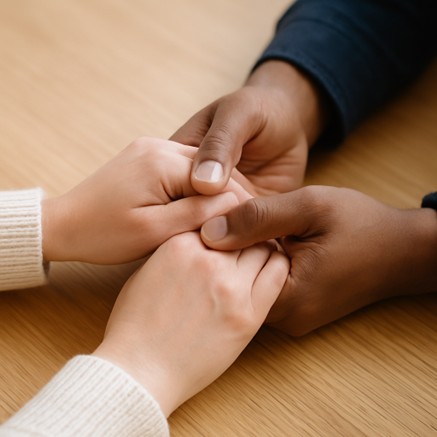
The Dos: What Helps Therapy Succeed
Therapy works best when you treat it like training for your relationship—not just a space to vent. It’s where you build new habits, learn better communication, and make room for reconnection.
Here are the most important “dos” to help you make the most of each session—whether you’re attending couples therapy in Vancouver or online from the comfort of home.
Do Speak Honestly—even when it’s uncomfortable
Honesty is the foundation of progress. Your therapist isn’t there to judge you. They’re there to help both of you understand what’s happening beneath the surface—emotionally, practically, and relationally.
That only works when you’re truthful about what you’re thinking and feeling.
That doesn’t mean dumping harsh criticism or unfiltered emotions in the room. It means showing up as your real self—your fears, hopes, frustrations, and all.
Tip: If something feels too hard to say, try starting with, “This is difficult for me to express, but it matters.” That kind of vulnerability opens the door to deeper connection.
Do Use “I” Statements, Not Blame Language
There’s a huge difference between:
- “You never listen to me.”
- And: “I feel unheard when I talk, and I’m not sure how to get through.”
Blaming language (“You always,” “You never,” “You don’t care”) puts your partner on defence. And once the brain goes into fight-or-flight mode, listening shuts down. In therapy, your goal is connection—not confrontation.
Start with “I feel…”, “I need…”, or “I’m struggling with…” and you’ll be surprised how much more your partner hears you.
Do Commit to Showing Up (Literally and Emotionally)
Therapy isn’t a one-and-done solution. It’s a process.
- Skipping sessions or cancelling last-minute breaks momentum.
- Coming physically but staying emotionally shut down also holds things back.
Progress happens when both people show up consistently, ready to engage. Even if you don’t feel like talking much, simply being present—open to hearing and being heard—moves the needle forward.
And if you’re doing online couples therapy, treat it with the same respect you would an in-person session: find a quiet space, turn off distractions, and give your partner your full attention.
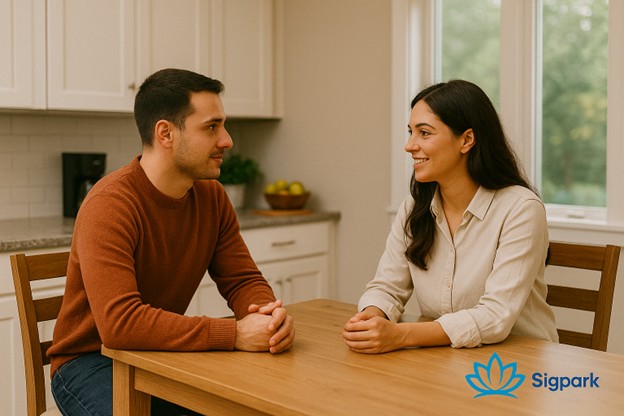
Do Practice Between Sessions
The work doesn’t end when the session does.
Therapy will give you specific communication tools—like active listening techniques, de-escalation strategies, or conflict repair steps. But these tools only work if you actually use them at home.
Here’s how to stay accountable:
- Keep a shared journal of insights or takeaways
- Schedule 15-minute “relationship check-ins” once a week
- Celebrate small wins—like a conversation that went better than usual
In fact, the Gottman Institute found that couples who intentionally practise emotional repair strategies outside of therapy were significantly more likely to stay together and maintain a sense of connection.
Do Stay Curious Instead of Critical
One of the most powerful shifts in therapy is moving from “Why are you doing this to me?” to “What’s going on inside you that I haven’t understood yet?”
When you stay curious, you create space for empathy. You give your partner a chance to open up instead of shut down. And you give your relationship a much-needed pause from old cycles of blame and frustration.
Remind yourself: You’re on the same team. The goal isn’t to win. The goal is to understand each other more deeply.
Do Trust the Process
Not every session will feel like a breakthrough. That’s okay.
Some sessions will feel hard. Others might seem uneventful. But like physical therapy or language learning, it’s the accumulation of small moments that create real change.
If you stick with it—and engage with it—therapy becomes less about fixing and more about strengthening. Less about what’s wrong, and more about how to build something stronger together.
The Don’ts: Common Pitfalls That Stall Progress
While there’s no perfect way to do couples therapy, there are definitely a few behaviours that can make the process harder—for both you and your partner.
These common “don’ts” are worth watching for. They tend to sneak in when emotions run high or when one (or both) partners are feeling unsure about the process. Recognizing them early is key to keeping your sessions productive and your connection growing.
Don’t Interrupt or Talk Over Your Partner
This is one of the most common habits that couples bring into therapy—and one of the most counterproductive.
Even when the urge to respond is strong, interrupting sends a message that your point is more important than your partner’s. And when people don’t feel heard, they stop trying to share.
Therapists will often pause conversations to highlight this dynamic—not to shame anyone, but to slow things down and rebuild the trust needed for real listening. If you notice yourself getting ready to jump in, take a breath instead.
Pro tip: Write down what you want to say. It helps you remember your point and stay calm while your partner speaks.
Don’t Use Therapy as a Weapon
It might sound obvious, but it happens more than you’d think.
Saying things like “even the therapist agrees with me” or bringing up past sessions in a combative way undermines the entire process. Therapy should be a safe space for vulnerability—not a place to score points.
If something the therapist said really stuck with you, that’s great—bring it up in a way that invites discussion, not defensiveness.

Don’t Expect the Therapist to Take Sides
Couples therapy is unique because the “client” is the relationship—not one partner over the other. This means your therapist won’t label one of you as the problem.
They’ll help identify patterns and explore how each person contributes to the dynamic. Even if one partner feels more “at fault,” progress depends on shared accountability and teamwork.
So if you’re going into the process hoping the therapist will validate your position or correct your partner, you may leave frustrated.
Therapists are trained to stay neutral, curious, and compassionate—because change happens when both partners feel safe to explore what’s really going on.
Don’t Shut Down or Withhold
Silence might feel safer than saying something you’ll regret—but emotional withdrawal can be just as damaging as yelling.
If you tend to shut down during conflict, therapy is a chance to explore that reaction and learn healthier coping strategies. Your therapist can help create space for slower-paced conversations that don’t feel overwhelming.
It’s okay to ask for a moment to collect your thoughts. But stonewalling—tuning out or disengaging completely—makes progress almost impossible.
Don’t Come With an Agenda to Win
Couples therapy isn’t a courtroom. It’s not about proving who’s right or listing every complaint in order. If your mindset is focused on getting your partner to change while you stay the same, things will stall quickly.
The couples who get the most out of therapy come in with a desire to understand, not convince. They ask, “What can we do differently together?” instead of “How can I finally get them to see I’m right?”
Don’t Expect a Quick Fix
This is a big one.
Therapy isn’t a one-hour solution. It’s a process of uncovering, unlearning, and rebuilding. Some sessions might feel like breakthroughs. Others might feel frustrating or slow. That’s part of the journey.
It’s especially tempting to give up after a tough session or two. But that’s often when the most meaningful growth is just starting. Stick with it.
Studies show that couples who commit to at least 8–12 sessions are significantly more likely to maintain lasting changes in communication, satisfaction, and trust.
What to Expect from Couples Therapy
If this is your first time considering therapy, it’s completely normal to feel a little anxious or uncertain. Maybe you’re worried the sessions will be emotionally intense. Maybe you’re not sure what to say. Or maybe you’ve tried therapy before, and it didn’t help the way you hoped.
Here’s the good news: couples therapy isn’t designed to shame or blame. It’s designed to help. And if you walk in with the right mindset, it can become one of the most important investments you make in your relationship.
Your First Few Sessions Will Focus on Safety and Understanding
During the first one to three sessions, most therapists will:
- Learn about your relationship history
- Explore key concerns from each partner’s perspective
- Identify communication patterns and areas of emotional tension
- Begin building a roadmap for how therapy will help you move forward
No pressure to jump into deep conflict right away. These initial conversations are more about understanding your dynamic than fixing it on the spot.
You might be asked questions like:
- “How do you usually handle conflict?”
- “What do you feel is missing in your connection?”
- “When do you feel most close—or most distant?”
These questions aren’t just for information. They’re also the start of you and your partner learning how to talk about your relationship differently—with more care, clarity, and compassion.
Therapy Isn’t About Taking Sides—it’s About Changing Patterns
A good couples therapist isn’t a referee. They won’t “vote” on who’s right or wrong. What they will do is help you both identify:
- Reactive loops that lead to repeated arguments
- Unspoken emotional needs that often get buried under blame
- Attachment wounds that may be driving withdrawal or frustration
In short, therapy is less about the surface issue (the laundry, the tone of voice, the dinner plans) and more about what’s going on underneath—where most relationship pain actually lives.
How Long Does It Take?
There’s no one-size-fits-all answer. Some couples feel improvement after just a few sessions. Others work with their therapist over several months to untangle deeper trust issues or build new skills.
That said, studies show that 8–12 sessions is the average range for noticeable, lasting change in communication, emotional safety, and conflict resolution.
Your therapist might recommend:
- Weekly sessions to build momentum
- Bi-weekly check-ins for maintenance
- “Homework” between sessions—small conversations or practices to try at home
The goal isn’t perfection. It’s consistent growth.
Tools You’ll Actually Use in Real Life
Modern couples therapy isn’t just about talking. You’ll also learn practical, research-backed tools—like:
- How to listen without interrupting or dismissing
- How to “repair” after conflict instead of letting resentment build
- How to express emotional needs clearly without starting a fight
- How to rebuild emotional intimacy, even after distance or betrayal
These aren’t abstract theories—they’re tangible habits that you’ll be able to use long after therapy ends.
If You’re Nervous—That’s Normal
A lot of couples feel unsure before they start. Some worry they’ll be judged. Others worry that opening up will make things worse before they get better.
But if you’re both committed—even just a little—to showing up with honesty and an open mind, therapy can become a space that helps you:
- See each other more clearly
- Heal old hurts
- Create new emotional habits
- And find your way back to connection
At Sigpark Counselling in Vancouver, This Is Exactly What We Support
Led by Registered Clinical Counsellor Sangeeta Sirohi (MSc Psychology), Sigpark offers a warm, inclusive, and evidence-based environment for couples of all backgrounds. We work with:
- Married and long-term partners
- Intercultural and LGBTQIA2S+ couples
- Parents, new couples, and those navigating separation or betrayal
Our approach blends the Gottman Method, CBT, attachment-based therapy, and emotion-focused strategies, depending on what each couple needs most.
Sessions are available in-person in Vancouver or online—whichever makes it easier for you to stay consistent.
Want to learn more or see if it’s the right fit for you and your partner?
You can start with a free 15-minute consultation—no pressure, no obligations. Just a chance to explore whether this step makes sense for your relationship.
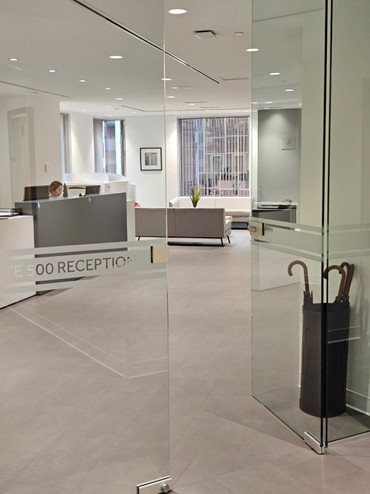
Final Thoughts: Show Up, Stay Open, and Keep Going
Couples therapy isn’t about blame. It’s not about airing every grievance or reliving the same fights. And it’s definitely not about proving who’s right.
It’s about something much more powerful: learning to relate to each other with more empathy, clarity, and care.
It’s about slowing down the reactive patterns that create distance—and creating space for new, healthier habits to take root. It’s about repairing what’s been strained, rebuilding what’s been broken, and rediscovering what brought you together in the first place.
And no, it’s not always easy. But if both of you are willing to show up—even imperfectly—there’s a real opportunity for change.
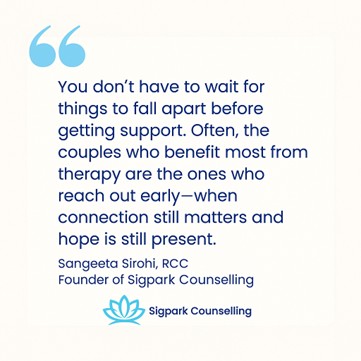
So whether you’re just starting out, struggling through a tough season, or hoping to reconnect after years of feeling emotionally distant, therapy can help. And if you’re looking for support in a way that feels respectful, grounded, and genuinely helpful, you’re not alone.
If You’re Ready to Start… Here’s What to Do Next
Sigpark Counselling offers both in-person couples therapy in Vancouver and online couples counselling across BC, making it easy to get started in a way that fits your life.
Your first step? A simple, free 15-minute consultation with Sangeeta.
There’s no pressure to commit. No obligation to continue. Just a conversation to explore whether this feels like the right step for you and your partner.
Book your free consultation here
Or visit www.sigparkcounselling.com to learn more.
Before You Go, Remember:
- Do speak honestly, listen with curiosity, and stay engaged.
- Don’t use therapy to blame or “win.”
- Do treat it like a team effort—because real growth always takes two.
- And don’t underestimate the power of showing up. That’s where healing begins.
You’ve already taken the hardest step by looking for support. The rest? That’s where things begin to shift.

